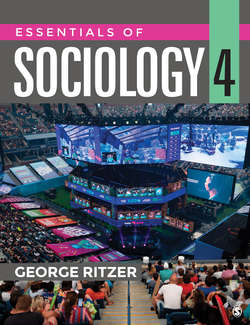Читать книгу Essentials of Sociology - George Ritzer - Страница 90
На сайте Литреса книга снята с продажи.
Alice Goffman
Оглавление© University of Chicago Press
Maintaining a certain level of objectivity and distance from the individuals one is researching can prove challenging, especially when one is immersed in their daily lives for an extended time. Ethical dilemmas can arise when researchers empathize too much with the people being studied. Alice Goffman found herself facing just such a dilemma when conducting fieldwork on how young black men and their families negotiate the criminal justice system in one Philadelphia neighborhood she calls 6th Street. Most of these men were on parole or probation or had outstanding warrants. They spent much of their time trying to avoid the police and incarceration. Law enforcement does not make this easy for them. Goffman observed the police harassing these men in a variety of ways, from stopping and frisking them on the streets to searching their homes, often without probable cause. The courts offer little recourse. Missed court dates and failure to pay court fees make it difficult for these men—and by extension their families and friends—to avoid the legal system.
During the six years that Goffman was in the field, she developed close relationships with two men in particular, Mike and Chuck. For a time, she even became their roommate. While establishing strong connections is important to build trust and gain access to research sites and subjects, Goffman found herself spending more time—and feeling more comfortable—with her friends on 6th Street than she did at the university at which she was studying. She also found herself engaging in legally questionable activities. One night she spent “on the run” with Chuck and his brother Reggie, hiding with them in a neighbor’s house from the police. After Chuck was shot and killed, Goffman drove Mike around to try to find Chuck’s killer. During one of these drives, Goffman waited in the car when Mike, who was carrying a loaded gun, got out and followed a man whom he thought shot Chuck. Luckily, Mike determined that this was the wrong man and returned to the car. If Mike had shot and killed this man, Goffman could have been an accomplice in a conspiracy to commit murder. On the Run reveals that the decision of when to observe and when to participate is complicated both ethically and legally when conducting ethnographic research. ●
Visit edge.sagepub.com/ritzeressentials4e, to
Watch Goffman discuss her research findings from On the Run in her TED Talk, “How We’re Priming Some Kids for College—and Others for Prison.”
Read a critical examination of the reliability of Goffman’s ethnographic methodology in Gideon Lewis-Kraus’s (2016) article, “The Trials of Alice Goffman.”
For 40 years researchers studied the progression of syphilis in hundreds of poor black men in Tuskegee, Alabama. Unethically, they did not tell them they had the disease, nor did they treat them for it. Worse, they simply watched them suffer and eventually die painfully.
Courtesy of ONE Archives at the USC Libraries
